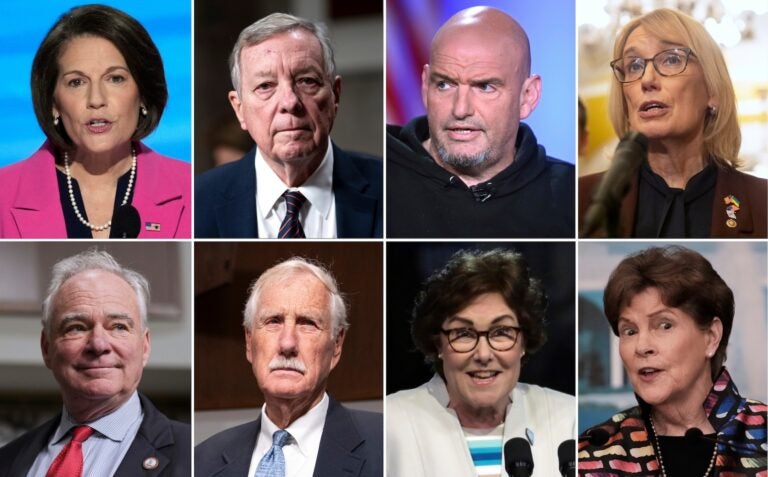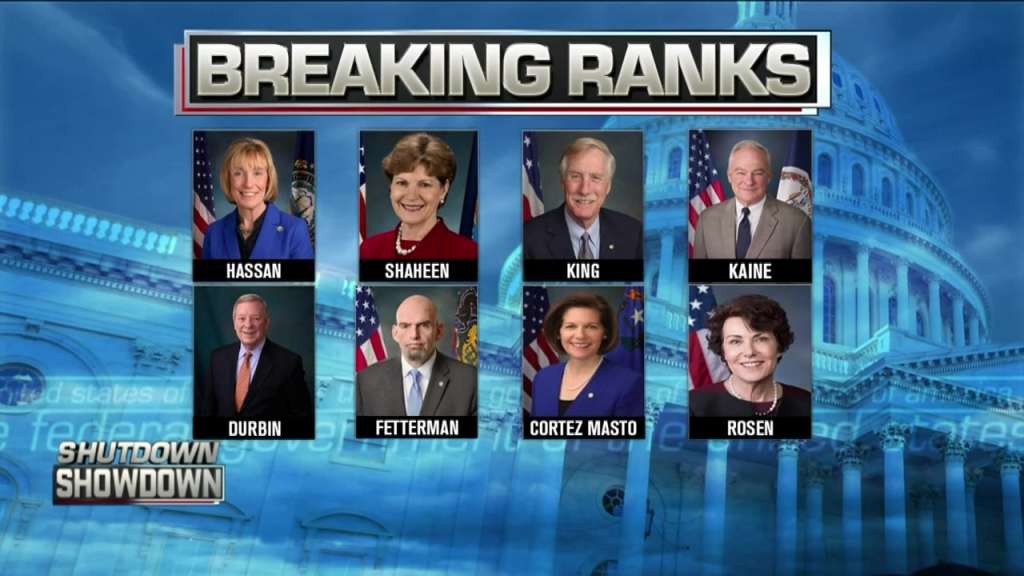A Courageous Stand: The 8 Democrats Who Voted to End the Shutdown psss
A Courageous Stand: The 8 Democrats Who Voted to End the Shutdown

In the complex and often contentious world of American politics, there are moments when politicians have to rise above partisanship to make decisions that directly affect the well-being of the American people. One such moment came during the recent government shutdown, when eight brave Democrats voted to end the impasse, going against the majority of their own party. This article delves into their courage, motivations, and the political implications of their actions, providing a nuanced look at how these lawmakers prioritized the country’s needs over party lines.
Section 1: The Context of the Shutdown
The shutdown of the U.S. government is never just a political maneuver—it is a crisis that impacts millions of lives. Furloughed government workers, halted services, and disrupted programs create chaos, not only within Washington but across the nation. In this environment, the stakes are high. Every vote counts, and the potential for lasting damage to the country’s credibility and its citizens’ trust in the government is immense.
The recent shutdown was a result of gridlock over budget disagreements, with Congress unable to pass critical funding measures. The shutdown, in particular, was tied to partisan struggles that intensified divisions rather than offering solutions. With so many citizens depending on government services—whether it be healthcare, national security, or public welfare—every day the government remained shut down was another day of uncertainty for them.

Section 2: The Eight Democrats Who Stood Out
While much of the Democratic Party fell in line with the broader party stance, these eight Democrats defied the norm. They chose to prioritize their constituents and the functioning of the government over party loyalty, demonstrating a level of political courage that’s all too rare.
John Fetterman (Pennsylvania)
Fetterman, a former mayor turned U.S. senator, has built a reputation for his unorthodox style and blunt approach to politics. Despite his typically progressive views, he voted to end the shutdown, citing the damage being done to Pennsylvania’s working-class families. For Fetterman, this vote wasn’t about playing politics—it was about the people he serves. His decision was widely recognized as an act of courage, as it risked alienating some of his supporters, but it showed his dedication to practical solutions over ideological purity.
Dick Durbin (Illinois)
Dick Durbin, the Senate’s second-ranking Democrat, has a long history of fighting for progressive values. However, his vote to end the shutdown was driven by the harsh reality that continued government paralysis was hurting American citizens. Durbin has often been known for his ability to work across the aisle, and this vote reaffirmed his reputation as a pragmatic leader focused on outcomes rather than partisan victory.

Angus King (Maine)
Angus King, who serves as an independent but caucuses with the Democrats, is known for his centrist views and ability to work with both sides of the aisle. His vote was emblematic of his desire to break free from party politics and find common ground. In a deeply polarized Congress, King’s willingness to vote for a bipartisan solution showed that there are still politicians who understand the need to act for the greater good, not just party loyalty.
Catherine Cortez Masto (Nevada)
As the first Latina U.S. senator from Nevada, Cortez Masto has been a strong voice for immigrant rights, social justice, and economic reform. Her vote to end the shutdown was not just about resolving a political crisis—it was about the livelihoods of the Nevadans who depend on government assistance. For Cortez Masto, voting for the shutdown’s end was a reminder that a functioning government is essential for the prosperity of her state.
Jacky Rosen (Nevada)
Jacky Rosen, another Democratic senator from Nevada, also put the needs of her state first by voting to reopen the government. With Nevada’s economy heavily reliant on tourism, casinos, and federal workers, the shutdown had an outsized effect on local businesses. Rosen’s decision was both a political and economic one, and it reflected her commitment to ensuring her constituents had access to vital services, like the protection of national parks and public safety programs.

Tim Kaine (Virginia)
Tim Kaine, a former governor of Virginia and now a U.S. senator, has long been a supporter of bipartisanship. Known for his calm demeanor and willingness to engage across the political spectrum, Kaine’s vote reflected his deep belief that the American government must always serve the people, no matter the political climate. Kaine’s history of collaboration made him a natural figure to take the lead in this difficult moment, demonstrating that party lines should not dictate the welfare of citizens.
Jeanne Shaheen (New Hampshire)
Jeanne Shaheen, the senior senator from New Hampshire, is known for her advocacy on healthcare, the economy, and national security. Her vote to end the shutdown was motivated by a deep sense of responsibility to the citizens of New Hampshire, many of whom were directly impacted by the funding halt. By voting for a resolution, Shaheen put her dedication to practical governance over the friction of party politics, earning widespread admiration for her commitment to the public good.
Maggie Hassan (New Hampshire)
Like Shaheen, Maggie Hassan of New Hampshire represents a state that was severely impacted by the shutdown. With a strong focus on education and healthcare, Hassan has consistently championed policies that benefit middle-class families. Her vote to end the shutdown was about ensuring that these services continued uninterrupted, proving that she values her state’s needs over partisan pressures.

Section 3: Why These 8 Democrats Chose to Break Party Lines
Principled Decision-Making
For these eight senators, their votes were rooted in principles of fairness and duty to their constituents. While it may have been politically expedient to side with their party’s leadership, they understood that the consequences of a prolonged shutdown were too dire to ignore. These lawmakers were not merely reacting to the political moment; they were making a considered decision to act in the best interest of the American people.
In choosing to vote against the majority of their party, these individuals demonstrated the importance of placing public service above political careerism. Their votes showed that true leadership requires the ability to break away from party orthodoxy and do what is right, even at the risk of alienating some supporters.
Political Fallout
Defying the Democratic Party’s leadership did not come without risk. These eight senators likely faced backlash from both their colleagues and their political base. The party’s leadership might have viewed their votes as a betrayal, while progressive activists could have criticized them for not holding firm against Republican demands. Nevertheless, these lawmakers showed that they were more concerned with the long-term health of the nation than short-term political gain.
In the polarized environment of today’s Congress, such acts of courage are rare. However, these Democrats’ decisions send a clear message: their commitment to public service outweighs any temporary political cost.
Public Reception and Media Reaction
Public reaction to their votes was mixed, but largely supportive of their independent stances. The media recognized their courage and many commentators praised their willingness to prioritize their constituents’ needs over party loyalty. While some criticized the votes as a breach of party discipline, the prevailing narrative in the media was one of respect for these Democrats’ desire to break gridlock and move the country forward.
Section 4: The Broader Implications of Their Votes
Political Impact
The votes of these eight Democrats had significant implications for the broader political landscape. In a time of intense partisan divide, they proved that it is possible to rise above the noise and work for the collective good. Their votes also sent a message to Washington: that a functional government, which works for its citizens, must come before political gamesmanship.
This moment could be a turning point in how future legislation is approached. If more lawmakers adopt the same approach of putting people before party, we could see a future of more cooperative and effective governance in Congress.
A Model for Future Lawmakers
The actions of these eight Democrats offer a valuable lesson for future lawmakers. In a time when the electorate is growing weary of partisan bickering, these senators showed that bipartisanship can still be achieved through thoughtful, independent decision-making. Their courage could serve as a model for younger lawmakers looking to break free from the constraints of party politics and make a real difference in the lives of their constituents.

Section 5: Final Reflections
The eight Democrats who voted to end the government shutdown exemplify the values of courage, integrity, and selflessness. In a time when the American government was at a standstill, they made the difficult choice to put the needs of their country above partisan interests. Their bravery serves as a reminder that true leadership is about doing what is right, not what is easy.
The actions of these eight senators represent a glimmer of hope in an era of intense polarization. By choosing to vote to end the government shutdown, they set aside political affiliations and put the American people first. As we look toward the future, we can only hope that more leaders will rise to the occasion and follow their example of courageous, bipartisan action.
Father Requests Nursing Home Over Living with Family – A Heartfelt Story













